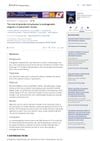Search
for
Sort by
Research
690-720 / 1000+ resultsresearch Treatment of Pediatric Alopecia Areata: A Systematic Review
Topical corticosteroids are the best initial treatment for children's alopecia areata.
research Immunopathology and Immunotherapy of Inflammatory Skin Diseases
New targeted immunotherapies are improving treatment for inflammatory skin diseases.

research Relative Efficacy of Minoxidil and the 5-Alpha Reductase Inhibitors in Androgenetic Alopecia Treatment of Male Patients
Dutasteride is the most effective hair loss treatment after 24 weeks, but finasteride leads to the most hair growth after 48 weeks.

research Classification Framework for Healthy Hair and Alopecia Areata: A Machine Learning Approach
Machine learning can accurately identify Alopecia Areata, aiding in early detection and treatment of this hair loss condition.
research Expert Consensus on the Management of Androgenetic Alopecia in India
Early diagnosis and a combination of treatments, including minoxidil and finasteride, are recommended for managing hair loss in India.
research The Effects of Lower vs Higher Cell Number of Platelet-Rich Plasma on Hair Density and Diameter in Androgenetic Alopecia: A Randomized, Double-Blinded, Placebo, Parallel-Group Half-Scalp IRB-Approved Study
Higher cell number PRP improves hair density and diameter more than lower cell number PRP.

research Controlled Clinical Trial for Evaluation of Hair Growth with Low Dose Cyclical Nutrition Therapy in Men and Women Without the Use of Finasteride
Low dose cyclical nutrition therapy can consistently and safely improve hair growth and density without needing anti-androgens.

research Progress in the Use of Platelet-Rich Plasma in Aesthetic and Medical Dermatology
Platelet-rich plasma (PRP) is effective in treating various skin conditions and improving hair density, thickness, and patient satisfaction, with lower relapse rates for Alopecia Areata.

research Adipose-Derived Stem Cells in Skin Diseases, Wound Healing, and Skin Defects: A Review
Fat-derived stem cells show promise for treating skin issues and improving wound healing, but more research is needed to confirm the best way to use them.

research The AR/miR-221/IGF-1 Pathway Mediates the Pathogenesis of Androgenetic Alopecia
A specific pathway involving AR, miR-221, and IGF-1 plays a key role in causing common hair loss.

research Use of Botulinum Toxin for Androgenic Alopecia: A Systematic Review
Botulinum toxin injections can help treat common hair loss in men, but more research is needed to confirm this and understand how it works.
research Male Androgenetic Alopecia
Male pattern baldness worsens with age and can be treated with medications like minoxidil and finasteride, but side effects and personalized care are important.

research Molecular Monitoring of Short- and Long-Term Transcriptional Effects of Hair Growth Stimulating Agents
Hair growth serums A and C can affect hair growth genes and pathways, suggesting potential for personalized hair loss treatments.

research The Proportion of Catagen and Telogen Hair Follicles in Occipital Scalp of Male Androgenetic Alopecia Patients: Challenging the Established Dogma
The belief about hair shedding phases is likely incorrect and needs reevaluation.

research Autologous Platelet Concentrates in Aesthetic Medicine
Autologous platelet concentrates show promise in esthetic treatments but need more standardized research.

research Oral Supplementation with L-Cystine, Serenoa Repens, Cucurbita Pepo, and Pygeum Africanum in Chronic Telogen Effluvium and Androgenetic Alopecia: A Double-Blind, Placebo-Controlled, Randomized Clinical Study
The supplement significantly improves hair density and appearance in people with hair loss.

research A Randomized, Double-Blind, Placebo-Controlled, Half-Head Study to Evaluate the Effects of Platelet-Rich Plasma on Androgenetic Alopecia
PRP injections did not significantly improve hair growth in men with androgenetic alopecia.

research Autologous Stem Cell-Derived Therapies for Androgenetic Alopecia: A Systematic Review of Randomized Control Trials on Efficacy, Safety, and Outcomes
Stem cell therapies show promise for hair regrowth in androgenetic alopecia.

research The Role of Platelet-Rich Plasma in Androgenetic Alopecia: A Systematic Review
Platelet-rich plasma may improve hair density and count in male pattern hair loss, but more high-quality research is needed.

research A Meta-Analysis Study on the Association Between Smoking and Male Pattern Hair Loss
Smoking increases the risk of male pattern hair loss.

research Efficacy of Platelet-Rich Plasma Versus 5% Topical Minoxidil for the Treatment of Androgenetic Alopecia
PRP therapy is more effective than minoxidil for treating hair loss from androgenetic alopecia.

research Topical Cetirizine for the Management of Androgenic Alopecia: Results of a Pilot Study
Topical cetirizine may help increase hair length in male pattern baldness and could be an alternative to minoxidil with fewer side effects.

research Psychosocial Impact of Androgenetic Alopecia on Men: A Systematic Review and Meta-Analysis
Hair loss (androgenetic alopecia) mildly to moderately affects men's quality of life but not significantly their mental health.

research Effect of Gender-Affirming Hormone Therapy on Hair Growth: A Systematic Review of the Literature
Gender-affirming hormone therapy changes hair growth in transgender people, with feminizing therapy reducing hair and masculinizing therapy increasing it, but sometimes additional treatment is needed.

research Improving the Efficacy of Anti-Hair Loss Drug Treatments With a Cosmetic Lotion Containing Caffeine, Taurine and Growth Factors
Adding a cosmetic gel with caffeine, taurine, and growth factors to standard hair loss treatments could improve results.

research Proceedings of the Ninth World Congress for Hair Research 2015
The 2015 Hair Research Congress concluded that stem cells, maraviroc, and simvastatin could potentially treat Alopecia Areata, topical minoxidil, finasteride, and steroids could treat Frontal Fibrosing Alopecia, and PTGDR2 antagonists could also treat alopecia. They also found that low-level light therapy could help with hair loss, a robotic device could assist in hair extraction, and nutrition could aid hair growth. They suggested that Alopecia Areata is an inflammatory disorder, not a single disease, indicating a need for personalized treatments.

research Oral Presentation Abstracts
The conclusions are: fecal short-chain fatty acids may help prevent cancer, fiber intake can reduce obesity, weight loss is hard for obese people, low BMI cancer patients are more prone to chemotherapy side effects, intermittent fasting benefits gut health, cherry laurel has health benefits in rats, certain gene variations can increase stress in hair loss patients, fecal acids can affect blood sugar levels, cold agglutinin can affect blood test results in autoimmune patients, and people with Crohn's disease have higher levels of a certain chemical in their blood.
research The Efficacy and Safety of Dr. SKS Hair Booster Serum in Adult Males and Females With Androgenetic Alopecia: An Open-Label, Non-Randomized, Prospective Study
Dr. SKS Hair Booster Serum is safe and effective for reducing hair fall and promoting hair growth.
research An Umbrella Review of the Use of Platelet-Rich Plasma in the Treatment of Androgenetic Alopecia
PRP is effective for treating hair loss, improving hair density, count, and thickness.